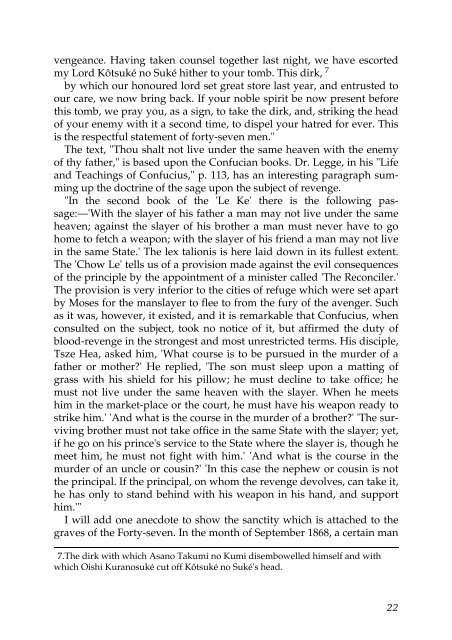- Page 1 and 2: Tales of Old Japan Lord Redesdale P
- Page 3 and 4: Preface In the Introduction to the
- Page 5 and 6: The Forty-Seven Rônins The books w
- Page 7 and 8: On the left-hand side of the main c
- Page 9 and 10: all preparations accordingly; and t
- Page 11 and 12: etainers having become Rônins, som
- Page 13 and 14: pedlars contrived to gain access to
- Page 15 and 16: the verandah; while the rest of his
- Page 17 and 18: castle. There being no possibility
- Page 19 and 20: is, that, for this audacious conduc
- Page 21: carrying out his intention of killi
- Page 25 and 26: enthusiasts called the Japanese nig
- Page 27 and 28: cheek by jowl with the old shrines
- Page 29 and 30: If you are in luck, you may cool yo
- Page 31 and 32: loved him even in death may be seen
- Page 33 and 34: But his dangers were not yet over;
- Page 35 and 36: implore you, desert me now!!" and a
- Page 37 and 38: And yet a girl is not disgraced if
- Page 39 and 40: The better the Japanese people come
- Page 41 and 42: desirable investments. The engageme
- Page 43 and 44: Kazuma's Revenge It is a law that h
- Page 45 and 46: y strong ties of friendship, and we
- Page 47 and 48: who was my foster-child. You had be
- Page 49 and 50: you had better return home as quick
- Page 51 and 52: lance exercise, and enjoyed both we
- Page 53 and 54: the vendetta within its precincts;
- Page 55 and 56: man who had come up from the castle
- Page 57 and 58: present chief of which is known as
- Page 59 and 60: used to fight for the honour of vic
- Page 61 and 62: "Yes, sir, at your service. I am al
- Page 63 and 64: temper, began fighting less careful
- Page 65 and 66: "It is a great honour for a humble
- Page 67 and 68: home rather crestfallen. Umanojô,
- Page 69 and 70: It soon became known that Banzayém
- Page 71 and 72: without obtaining a clue to the whe
- Page 73 and 74:
ack the sword, your head shall be l
- Page 75 and 76:
Mound of the Yoshiwara, has thwarte
- Page 77 and 78:
that any one was following him, swa
- Page 79 and 80:
When he had introduced the two appr
- Page 81 and 82:
deed, do you come to-morrow night w
- Page 83 and 84:
"Nay," answered Gombei, "but we hav
- Page 85 and 86:
women and children, and by foul and
- Page 87 and 88:
exhibitions by an actor dressed up
- Page 89 and 90:
one by one into the demon's chamber
- Page 91 and 92:
called Nô, which is performed on s
- Page 93 and 94:
The second piece was Tsunémasa. Ts
- Page 95 and 96:
fisherman is so transported with jo
- Page 97 and 98:
servant leading the way. Arrived at
- Page 99 and 100:
like the "spill-and-pelt" scene in
- Page 101 and 102:
The Wonderful Adventures of Funakos
- Page 103 and 104:
Sixteen and upwards being considere
- Page 105 and 106:
losing them to no purpose, thought
- Page 107 and 108:
that Jiuyémon does not find out wh
- Page 109 and 110:
"Listen to me, Master Takaségawa.
- Page 111 and 112:
At this the pair looked very foolis
- Page 113 and 114:
pipe, and kept a sharp look-out for
- Page 115 and 116:
Jiuyémon, out of gratitude for the
- Page 117 and 118:
Jiuyémon, having received this per
- Page 119 and 120:
heaven, begged the Emperor that his
- Page 121 and 122:
iron. Like the Gods Niô, 63 they s
- Page 123 and 124:
The Eta Maiden and the Hatamoto It
- Page 125 and 126:
annoyed him very much; however, he
- Page 127 and 128:
ing the girl to you. But for to-day
- Page 129 and 130:
"Dear me, Miss O Koyo, his lordship
- Page 131 and 132:
this tea-house. But, as people woul
- Page 133 and 134:
"Very well, then, the day after to-
- Page 135 and 136:
lull the suspicions of that fellow
- Page 137 and 138:
eauty; and Sazen, drawing aside a s
- Page 139 and 140:
have not so much money by me at pre
- Page 141 and 142:
desire. When he heard this, Kiyomor
- Page 143 and 144:
Fairy Tales I think that their quai
- Page 145 and 146:
"I'll go and call upon the sparrows
- Page 147 and 148:
place than it was time for them to
- Page 149 and 150:
"Oh!" answered the hare, "this is c
- Page 151 and 152:
That night, when the good old man w
- Page 153 and 154:
The Battle of the Ape and the Crab
- Page 155 and 156:
The Adventures of Little Peachling
- Page 157 and 158:
The Foxes' Wedding Once upon a time
- Page 159 and 160:
The History of Sakata Kintoki A lon
- Page 161 and 162:
The Elves and the Envious Neighbour
- Page 163 and 164:
grass rain-coats, and carrying sick
- Page 165 and 166:
entirely composed of dead men's rem
- Page 167 and 168:
I am taking care of myself; so for
- Page 169 and 170:
"We may congratulate ourselves on o
- Page 171 and 172:
this Sôgorô, he is not the only o
- Page 173 and 174:
"Ay! ay! what you say is just from
- Page 175 and 176:
standing to this day. He fell sick
- Page 177 and 178:
Then Shigayémon, one of the servan
- Page 179 and 180:
The peasants, having heard this deg
- Page 181 and 182:
whole household was thrown into con
- Page 183 and 184:
other nobles, Ogasawara Iki no Kami
- Page 185 and 186:
the castle of Sakura; and in the 17
- Page 187 and 188:
following day, the officers of that
- Page 189 and 190:
story of this nature in the house o
- Page 191 and 192:
to the Abbot was granted the right,
- Page 193 and 194:
1625, in honour of Yakushi Niôrai,
- Page 195 and 196:
How Tajima Shumé Was Tormented by
- Page 197 and 198:
whole body was thin and worn and th
- Page 199 and 200:
Concerning Certain Superstitions Ca
- Page 201 and 202:
overcome this mysterious drowsiness
- Page 203 and 204:
"It is true that he is but a common
- Page 205 and 206:
Sôda, who was wide awake; and so,
- Page 207 and 208:
was as big as either of the cats: t
- Page 209 and 210:
Tokutarô thought this very odd, an
- Page 211 and 212:
"I ought to have the honour of invi
- Page 213 and 214:
The Grateful Foxes One fine spring
- Page 215 and 216:
choosing a pretty spot, produced th
- Page 217 and 218:
And as she spoke, the fox shed tear
- Page 219 and 220:
which is nominally the reward of le
- Page 221 and 222:
time forth it came every night to t
- Page 223 and 224:
suspicious, and I shall have to tel
- Page 225 and 226:
"You don't know what you're talking
- Page 227 and 228:
Japanese Sermons "Sermons preached
- Page 229 and 230:
"Nammiyô! nammiyô!" grateful and
- Page 231 and 232:
"'Verily, as to this skull, whether
- Page 233 and 234:
Sermon I (The Sermons of Kiu-Ô, Vo
- Page 235 and 236:
hearts, which we would not change f
- Page 237 and 238:
garlands of flowers round torches,
- Page 239 and 240:
visit Kiôto, and had also ascended
- Page 241 and 242:
come upon him for fifty or a hundre
- Page 243 and 244:
Sermon II (The Sermons Of Kiu-Ô, V
- Page 245 and 246:
Well, this man's relations and frie
- Page 247 and 248:
well. The best plan will be for me
- Page 249 and 250:
this place I shall be dunning you t
- Page 251 and 252:
The relations, after hearing the fi
- Page 253 and 254:
Sermon III (The Sermons of Kiu-Ô,
- Page 255 and 256:
Môshi severely censures the disreg
- Page 257 and 258:
Chokichi, pretending not to know wh
- Page 259 and 260:
egan to compose poetry. One would w
- Page 261 and 262:
Old and young, men and women, rich
- Page 263 and 264:
However, young men, trusting to the
- Page 265 and 266:
Kami 117 disembowelled himself in t
- Page 267 and 268:
ceremony is gone through in other w
- Page 269 and 270:
although the hara-kiri cannot be ca
- Page 271 and 272:
One of the councillors present, add
- Page 273 and 274:
On Certain Things to Be Borne in Mi
- Page 275 and 276:
and took leave of them, and calling
- Page 277 and 278:
duty: he must perform his part in s
- Page 279 and 280:
Sanô reached out his hand to take
- Page 281 and 282:
it off, and then submit it for insp
- Page 283 and 284:
the blood. When the identification
- Page 285 and 286:
himself, to the condemned man, who
- Page 287 and 288:
death. I believe that, in the inter
- Page 289 and 290:
proposer, Ono Seigorô, who on more
- Page 291 and 292:
it is carried and received by a per
- Page 293 and 294:
pourers. A different sort of condim
- Page 295 and 296:
In old times the bride and bridegro
- Page 297 and 298:
The author of the "Sho-rei Hikki" m
- Page 299 and 300:
On the Birth and Bearing of Childre
- Page 301 and 302:
it of dried fish or seaweed which a
- Page 303 and 304:
he keeps until the time of the cutt
- Page 305 and 306:
in paper from their bosoms, they ho
- Page 307 and 308:
urgeoning, Hearn published this del
- Page 309:
www.feedbooks.com Food for the mind



